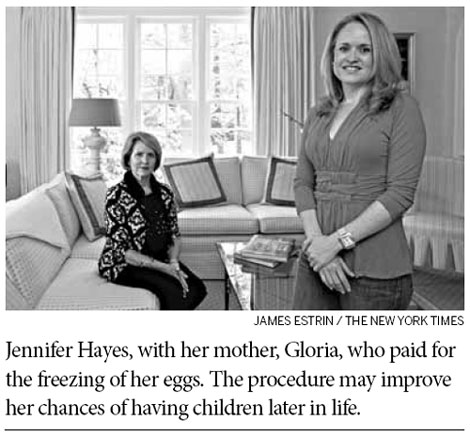A down payment on a future family
Updated: 2012-06-03 07:54
By Elissa Gootman(The New York Times)
|
|||||||

At the Colorado Center for Reproductive Medicine, a popular destination for women hoping to preserve their fertility by freezing their eggs, Dr. William Schoolcraft, the founder and medical director, has started to notice something different: more of the women are arriving with company.
"I see these patients come in, and they're with two elderly people, and I'm like, 'What the hey?'" Dr. Schoolcraft said.
The entourages, it turns out, are the parents, tagging along to lend support - emotional and often financial - as their daughters turn to the fledgling field of egg freezing to improve their chances of having children later on.
The technology to freeze a woman's delicate eggs to be used later, when the eggs being released by her ovaries may no longer be viable, has improved sharply over the past decade. There currently is no single source of data on the number of women who are choosing to freeze their eggs, but doctors in the United States say the practice is slowly growing.
The procedure remains expensive, costing between $8,000 and $18,000. And because it offers no guarantees and is still considered experimental by the American Society for Reproductive Medicine, a professional association, it can seem to some like an extravagant gamble.
Dr. Daniel Shapiro, the medical director of Reproductive Biology Associates of Atlanta, estimated that at least three-quarters of his center's egg-freezing patients - more than 100 over the past two years - have parents who paid part or all of the bill.
"I was surprised at first about the parental involvement, but now I expect it to be the case," said Dr. Shapiro, adding that many patients tell him, "My parents want me to have this as a gift."
His center, along with an offshoot called My Egg Bank North America, are trying to make it easier, and less uncomfortable, for family members to pay for the procedure, marketing the "Gift of Hope": a gift certificate and a silver charm bracelet for the recipients.
Gloria Hayes, who lives in Darien, Connecticut, remained quiet for months after hearing about egg freezing, hoping that her daughter Jennifer, a restaurateur in Telluride, Colorado, would broach the topic herself.
"I just didn't feel right approaching her about it, because it's almost a criticism in a way - 'You're getting old,'" Mrs. Hayes said. When Jennifer finally floated the idea, "I was thrilled," Mrs. Hayes said. "I thought this could just take a lot of the stress off her."
Mrs. Hayes and her husband offered to pay for the procedure, but Jennifer Hayes, 36, was initially reluctant to accept the money. "My mom said to me, 'Do you think we'd rather have this money sitting in an account or have a potential grandchild someday?'" she recalled. "When she positioned it that way, it somehow just changed the way I felt."
"It's a family decision," said Ms. Hayes, who now blogs about her experience at RetrieveFreezeRelax.com. "Because you're talking about your future family. Grandchildren are really important to parents. Everybody wants to experience being a grandparent."
Susan Lorman raised the idea of egg freezing after her daughter Stephanie, a sales representative in Los Angeles, had just broken up with a boyfriend and was in tears, distraught over the possibility of losing her chance at motherhood.
On the eve of her 36th birthday, Stephanie took her mother up on her suggestion and called a fertility doctor.
"It was a gift of love," Mrs. Lorman said. "I'd had my kids at 22, and here she is, a healthy, beautiful young woman who felt her years were passing her by."
As the technology has evolved, more fertility clinics across the United States have begun offering egg freezing to women preparing to undergo cancer treatment, which can affect fertility, and those seeking to expand their window for childbearing.
Amy West, 37, a psychologist in Chicago, said that she could have afforded the $7,600 bill, but that with her parents paying $5,000, "it somehow didn't feel like as scary an investment."
In November, Ms. West's mother, father and brother flew in for the egg retrieval, which followed days of hormone injections.
Even Ms. West's mother, an international environmental and human rights lawyer, could not resist a joke after hearing how many of her daughter's eggs were frozen. "I have 26 grandbabies!" she exclaimed.
The New York Times
(China Daily 06/03/2012 page12)